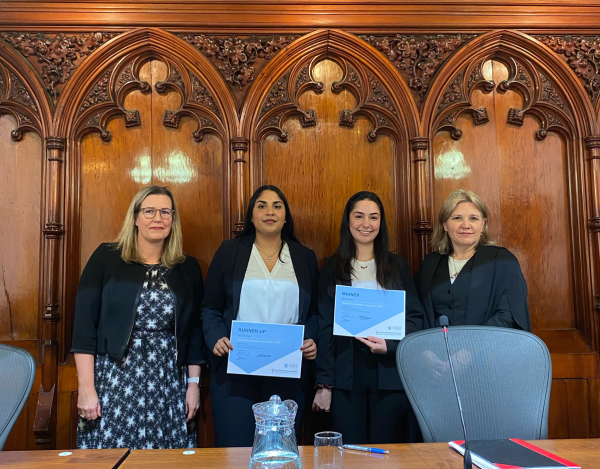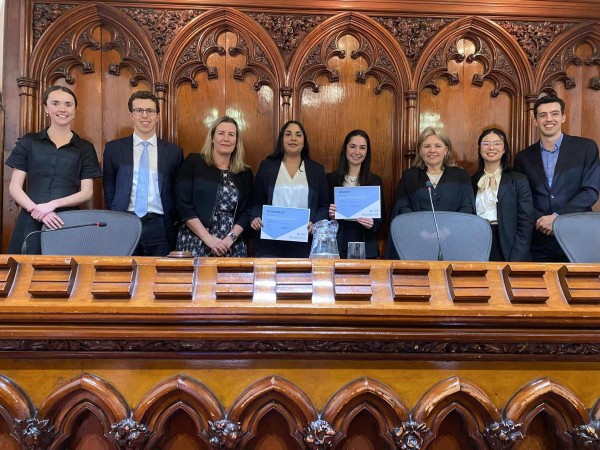Sentencing Advocacy Competition 2025
The 2025 Sentencing Advocacy Competition reached its conclusion with a final held in the historic Courtroom 1 of the Auckland High Court on 30 September 2025. Presided over by Justice Wilkinson-Smith, the event showcased the advocacy skills of two finalists: Mira Askari, who was named the winner, and runner-up Ina Chatha. Her Honour praised the finalists on the quality of their submissions, adding that they could both be mistaken for practising advocates.
Sponsored by Te Tāhū o te Ture | the Ministry of Justice and the New Zealand Bar Association | Ngā Ahorangi Motuhake o Te Ture, the competition offers students from the University of Auckland, Auckland University of Technology, and the University of Waikato the rare opportunity to appear before High Court Judges. In the competition, students present sentencing submissions on behalf of the prosecution or defence following fictitious defendants’ guilty pleas.

Left to Right: Rachael Reed KC, Ina Chatha, Mira Askari, Honourable Justice Wilkinson-Smith.
This year’s rounds spanned a wide range of offending. In the preliminaries, a second‑hand laptop sale gone wrong resulted in the defendant attacking the purchaser-to-be with the laptop intending to cause grievous bodily harm. The semi‑finals featured the arson of a heritage hostel after a chance encounter between a backpacker and her adulterous former partner. The final concerned an emerging rugby talent who, enraged by alleged referee bias, punched the referee with deadly consequences. In addition, the students contended with the defendant’s personal mitigating factors, such as prospect for rehabilitation, untreated mental health issues and the effect of incarceration on young children.
We were delighted to once again welcome Rachael Reed KC to say a few words on behalf of the New Zealand Bar Association at the final. Rachael highlighted the sensitivity and care required of advocates at a manslaughter sentencing, which is often conducted in the presence of both victims’ and offenders’ families. She congratulated the students on being alive to those considerations at this early stage of their careers.
“effective advocacy is not just about presenting submissions clearly, but also about being able to read the judge and adapt to their preferences..."
We caught up with the finalists after the event. For Mira Askari, in her final semester at the University of Auckland, the competition stood out because it allowed her to practise advocacy in a real courtroom setting without the high stakes of a real case. Having appeared before three different Judges, she learned that each Judge has a distinct style: “effective advocacy is not just about presenting submissions clearly, but also about being able to read the judge and adapt to their preferences while maintaining the persuasiveness of your argument.”
Mira credits her success to knowing her submissions and authorities well, which “worked better for me than writing out a script” as it allowed her to “keep a conversational tone” and directly “engage with the Judge”. Looking ahead, she says the experience has reinforced her passion for courtroom advocacy: “while appearing before a judge is daunting and unpredictable, it is also a thrilling experience that I look forward to pursuing further in the future.”
“This competition changed that, it really confirmed for me that I want to be a criminal lawyer. More importantly, it made me feel excited about a future where I can regularly appear in court.”
Runner-up Ina Chatha, a final-year law student at the University of Auckland, echoed Mira’s reflections on the value of the competition. She entered because of her strong interest in criminal law and especially sentencing, an area she had not engaged in at University since the second-year criminal law moot (“funnily enough,” Ina says, “I didn’t do particularly well in that”). Ina says the competition deepened her appreciation for the basics of advocacy; while legislation and case law are important, skills such as “anticipating straightforward, common‑sense arguments” can be just as valuable.
Ina’s preparation and balanced approach to sentencing resonated with many of the Judges. Beyond honing her skills, Ina found the experience transformative for her confidence, and her career aspirations. She admits doubting whether courtroom advocacy was for her, as she has “never felt like a ‘natural’ in the compulsory moots”. In her own words, “this competition changed that, it really confirmed for me that I want to be a criminal lawyer. More importantly, it made me feel excited about a future where I can regularly appear in court.”

Left to right: Claire Rees, Campbell Walker, Rachael Reed KC, Ina Chatha, Mira Askari, Honourable Justice Wilkinson-Smith, Angela Yang, Jonathan McLeay.
This competition would not be possible without the generous and continued support of the New Zealand Bar Association, for which we are deeply grateful. Our sincere thanks also go to the staff at the Auckland High Court for their assistance in running this competition, and to the Judges who gave their time and guidance to the students: Gault, Becroft, Anderson, MacGillivray JJ and Associate Judge Paulsen in the preliminaries; Downs and Becroft JJ in the semi-finals; and Justice Wilkinson-Smith in the final.
This article was written by Angela Yang, Judges’ Clerk at the Auckland High Court.
Related News
Rapley heads to Keble College
09 DecemberWitnessing skilful advocacy is rare. Most lawyers appearing…
Read moreThe Human Cost Behind SVA Prosecutions
08 DecemberThe report It’s a Love–Hate Relationship: Female Crown Prose…
Read more2025 Access to Justice Award Winner
17 SeptemberSonja Cooper has been awarded the 2025 Access to Justice Awa…
Read moreLegal Aid Review: NZBA Urges Reform to Protect Access to Justice
01 SeptemberWe recently submitted feedback on the Ministry of Justice’s …
Read more